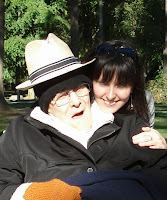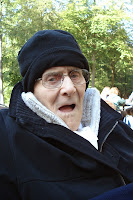My collection of memories for 2013 is fairly eclectic – I’ve spoken at conferences, run workshops, taken part in debates and appeared on radio and TV. I’ve become a Dementia Friends Champion and a member of the Dementia Action Alliance, as well as fundraising for Dementia UK and Alzheimer’s Society. I’ve become an Ambassador for BRACE, won ‘Best Independent Voice on Older People’s Issues’ at the Older People in the Media Awards, and made a film that was shown at the first ever G8 Dementia Summit.
Attending the Summit, and having tea with the Prime Minister afterwards, is arguably the most high-profile memory of 2013, but could it also be the one that has the most impact in the years ahead? I was asked after the Summit whether I thought the G8 would stick to their commitment to, “Find a cure or disease-altering therapy by 2025.” My answer is that it is up to all of us who are passionate about dementia to ensure that they do.
But for this, my last D4Dementia blog post of 2013, I want to share some memories with you that aren’t going to make huge headlines but will live in my heart and mind for a long time. So, in no particular order:
Meeting Kate Swaffer: Arguably the greatest privilege of the
year, and certainly one that I’ve spoken about extensively since, was meeting Kate, an online friend who became a real life friend over a
#dementiachallengers lunch in London. Kate’s grace, poise, humour, kindness and wisdom is inspirational - she also happens to be living with dementia. Kate,
along with the lovely people who featured in the G8 films (Hilary, Trevor and
Peter), are shining a vital light into what living with dementia REALLY means.
Moral of the story: Think myths and stigma about dementia
and then think again.
Our Memory Café: It’s
been a tough year for dementia services in my area. Our Singing for the Brain
(SFTB) closed down, and our Memory Café is mostly being propped up by people
attending from the local care home. Alongside the sadness of hearing about the
deterioration of some of our friends from SFTB, came the joy of seeing ladies
from the local care home singing along to some of their favourite tunes at our
impromptu music group at the Café. As one of the ladies said, “I thought I was
only going to get a cup of tea. I didn’t know we would have singing too. Thank
you so much.”
Moral of the story: Sometimes the small things in life bring
the most pleasure (and don’t require huge sums of money to deliver).
My dad’s last care home: I’m somewhat ashamed to admit that
since we cleared out my dad’s room following his death in April 2012, we hadn’t
been back to the care home that looked after him in the last two weeks of his
life. That isn’t because we didn’t want to, but despite the loveliness of the
home I still picture answering the door to the undertakers and seeing dad being
wheeled out of the home on their trolley. However, when I was asked if I could
show a colleague from NHSIQ around a good care home, there was nowhere else I
could have taken her. It was emotional to be back there again, but the huge
smiles, hugs and warm welcome from the amazing people working at the care home reminded me
yet again what a special place it is.
Moral of the story: For all the negative reports you hear
about social care, there are far more good places and people that are never spoken
about.
Finally…
People: I’ve met such a huge array of people this year – politicians,
health and social care professionals, managers, civil servants, business
owners, academics, families from all walks of life, and many inspirational people who are living with dementia. From the youngest
to the oldest, from those who are extremely knowledgeable about dementia to
those who feel completely baffled and are desperately seeking help, it’s fair
to say that each and every person has managed to inform and educate me in some
way.
Moral of the story:
We all have something to offer, and to dismiss others is to do ourselves
a great disservice.
So, it is with my precious collection of memories from 2013
that I close this blog post by wishing you all a very happy Christmas and a
peaceful, healthy and fulfilling 2014. My next D4Dementia blog will be in
January, and I’ve taken the difficult decision that D4Dementia will become
fortnightly from next year, so suffice to say it will take me somewhat longer
to reach my next century of blog posts. What won't change, however, is my passion for raising awareness of dementia, tackling 'difficult' topics, and providing positive and practical advice.
Thank you all for your amazing support over the last 12
months.
You can follow me on Twitter: @bethyb1886




